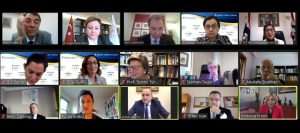This year’s Bilkent Tourism Forum, the ninth to be held, took place online via Zoom on December 10. The forum, organized annually by the Department of Tourism and Hotel Management, had a higher-than-ever international profile in 2020, with live connections linking participants in 72 countries. This global reach came about thanks in part to the department’s membership in the Alliance by Institut Paul Bocuse, an international network of partner institutions established by the French school of hospitality and culinary arts management.  The main aim of the Bilkent Tourism Forum is to address developments taking place in the world and in particular the tourism sector each year, and to contribute to the development and promotion of tourism by drawing attention to the opportunities as well as the threats facing the sector. The theme of this year’s forum was, inevitably, the COVID-19 pandemic, which has affected the entire world and whose effects are largely still ongoing.
The main aim of the Bilkent Tourism Forum is to address developments taking place in the world and in particular the tourism sector each year, and to contribute to the development and promotion of tourism by drawing attention to the opportunities as well as the threats facing the sector. The theme of this year’s forum was, inevitably, the COVID-19 pandemic, which has affected the entire world and whose effects are largely still ongoing.
Keynote speeches at the forum were given by Erkan Uçar, associate director of the Bilkent University School of Applied Technology and Management; Prof. Abdullah Atalar, rector of Bilkent University; Mustafa Erkayıran, deputy governor of Ankara; and Özgül Özkan Yavuz, deputy minister of the Ministry of Culture and Tourism. While Mr. Erkayıran provided information about the support given to businesses adversely affected by the pandemic in Ankara, Mr. Yavuz described the immediate recovery measures taken to restart tourism in Turkey as well as digital transformations undertaken by the Ministry.
Among the speakers addressing the forum attendees was Phantipha Iamsudha, ambassador of the Kingdom of Thailand to Ankara, who highlighted four policies implemented in Thailand to reduce the negative effects of the pandemic: safety and hygiene, environmental sustainability, extra experiences and yield. The following presentation, by Bekir Ödemiş, head of the Ankara Metropolitan Municipality’s Department of Culture and Natural Heritage, described the department’s work to protect Ankara’s cultural heritage during the pandemic.
They and other forum participants presented a wide range of perspectives, experiences and ideas regarding not only the impact of the crisis on this sector, so crucial to Turkey’s economy, but also the opportunities to adapt to changing market conditions in tourism. The point was made that, unlike previous crises, the COVID-19 pandemic has affected all markets and destinations around the world and brought travel and tourism activities to a standstill.
It was likewise noted that the fight against this crisis, which is global in nature, is also global and requires extensive international cooperation. Many of the speakers placed emphasis on the importance of innovation, digital transformation and sustainability. In discussing the potential opportunities that are likely to open up after the pandemic, several forum participants referred to the future of young people now studying tourism, who are preparing for the changes that are taking place and will be ready to take advantage of the new employment opportunities in the sector that will await them after the pandemic.
